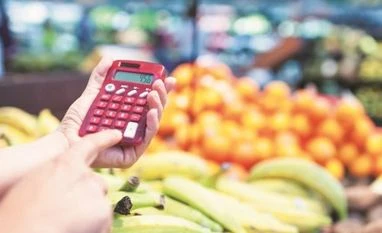The economic survey for 2020-21 has suggested revision in the weightage of food items to gauge the true picture of inflation in the country, and said new sources of price data also need to be incorporated in the wake of increasing retail e-commerce transactions.
As per the survey, the current spike in consumer price-based retail inflation of food prices is mainly a supply-side phenomenon.
The survey noted that the weights of all items in retail inflation are based on the NSO household consumption expenditure survey of 2011-12, adding the weight of food items in the index might have significantly decreased over the decade since then.
"There is a need to capture the revised weight of food items in the index to correctly depict the true picture of inflation in the country. Further, in the context of increasing retail e-commerce transactions, it is important to include such new sources of price data for the construction of price indices," as per the survey.
During 2020-21, retail and wholesale inflation saw movements in the opposite directions. While headline retail inflation saw an increase compared to the previous year, WPI inflation remained benign.
Supply-side shocks especially owing to COVID-19 pandemic affected the retail inflation with food articles contributing to the overall rise in inflation, said the Survey.
"The easing of supply-side restrictions, which saw inflation moderate in December 2020, are expected to continue this easing. Government interventions to augment the supply of commodities as well as to ensure the provision of essentials have likely softened the impact of the pandemic," it said.
More From This Section
Food inflation has already eased in December reducing overall inflationary pressures.
"Going forward, as food inflation eases further, overall inflation is expected to moderate further. On the other hand, improving demand conditions are likely to keep WPI inflation in the positive territory with improving pricing power for manufacturers," government said in the survey.
The headline CPI inflation averaged 6.6 per cent in 2020-21 (April-December) and stood at 4.6 per cent in December 2020, mainly driven by rise in food inflation, which has increased from 6.7 per cent in 2019-20 to 9.1 per cent in 2020-21 (April-December), owing to build up in vegetable prices.
Thali costs have increased between June 2020 and November 2020, they witnessed a sharp fall in the month of December reflecting the fall in the prices of many essential food commodities, as per the survey.
Food inflation has been driving overall consumer retail inflation due to the relatively more weight of food items in the index, it said, adding while food habits have undergone revisions over the decade since 2011-12 (base year of CPI), the base year of CPI needs revision.
The Economic Survey 2020-21, stated that a tight monetary policy might play a role to manage inflation when there is excess demand, which fuels inflation. However, the current scenario presents a different picture.
"This can be easily assessed from the fact that arrivals in the market, for agricultural commodities like onion, tomato and potato that have witnessed spikes in recent times, have been much lower compared to the previous years."
Citing surveys by IIM, Ahmedabad and the Reserve Bank, the government said the one year ahead inflation expectation for the retail inflation has risen during the current year.
As per the business inflation expectations survey of Indian Institute of Management (IIM) Ahmedabad, one year ahead inflation expectations for retail inflation slightly rose from 4 per cent in February 2020, to 4.4 per cent in October 2020.
While, the inflation expectations survey of households conducted by RBI also pointed to a slight rise in inflation expectations from 9.1 per cent in March 2020, to 9.7 per cent in November 2020, though it was lower compared to September 2020.
In order to control inflation, the government has taken several steps to improve availability of commodities such as pulses, onion and potato and make them available to consumers at affordable prices, such as banning export of onion for a brief period, imposition of stock limits, and easing import restrictions.
These measures have resulted in increased imports of onion, tur dal and masur dal in the country and resultant cooling of prices.
There are other measures including the price stabilisation fund (PSF) scheme for controlling prices of pulses by creating buffers and signing treaties with other countries to ensure assured supplies of some commodities among others.
)